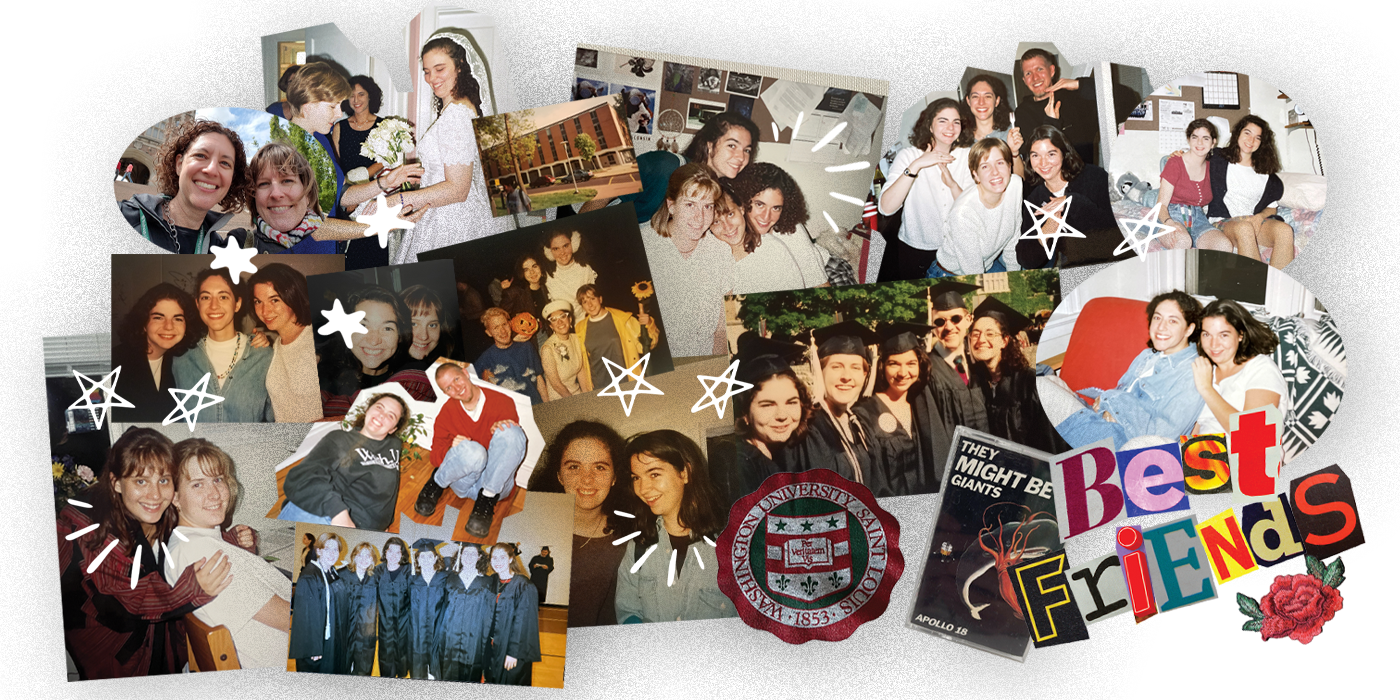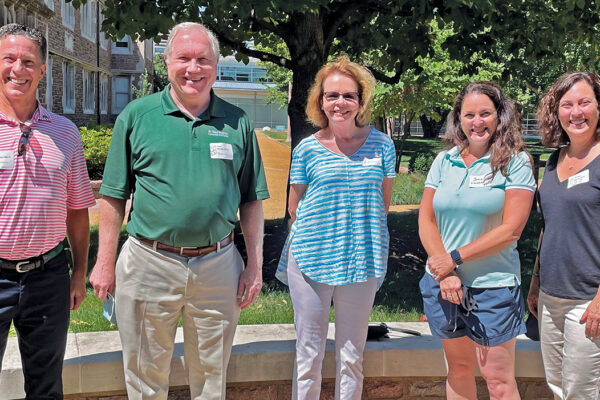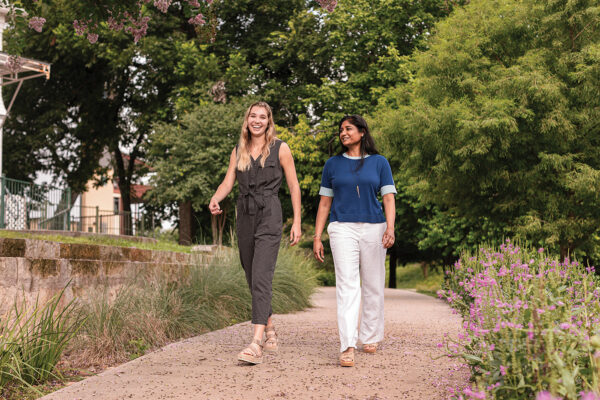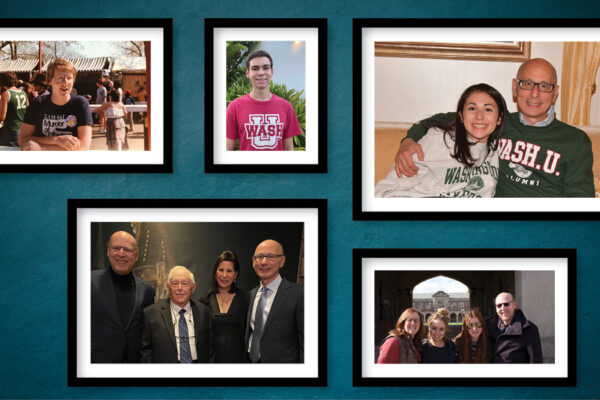There’s no place like home. Each year, that expression becomes real to a new class of students, for whom Washington University will become a second home. The sense of community and belonging experienced at WashU, however, endures long after the midnight runs to Bear’s Den and all-nighters in Olin Library have ended. After graduating, many WashU alumni come to realize the home they found here cannot be reduced to a physical building. Rather, it resides in the people — the friends, professors and mentors — whose presence filled those spaces with color and life.
This is the case for seven alumni from the Class of 1997. As incoming students, they were each assigned to live on the second floor of Liggett Hall on the South 40 and formed a close friendship. Their story might have ended after that first year. But from their random assignment emerged a chosen family. Through moves and marriages, careers and children, they can still count on one another nearly 30 years later.
“Washu encourages people to become their individual selves while also valuing and deepening connections with others.”
Heidi Spear, AB ’97
The first-year rooming selection process was decidedly low-key in 1993. Cindy Samuel Kalachek, AB ’97, recalls filling out a questionnaire with four questions: Morning or night person? Messy or neat? Hot or cold? Favorite music? At 18, Kalachek was a less-than-tidy night owl who proclaimed she loved jazz because it sounded cool. Her answers led to roommate Beth Haydon Bodan, AB ’97. They spoke once or twice by phone during the summer, mostly to determine who would supply a mini fridge and microwave. Kalachek, an only child, was nervous. This would be her first time living away from home and cohabitating.
Raised with two sisters, Karen Seelig Miller, AB ’97, was less concerned about sharing space. Her roommate, Erin Gleason Leyba, AB ’97, has three sisters, and the pair bonded over these and other similarities during several phone conversations. They also wrote each other letters, tucking in wallet-size yearbook photos so they would recognize each other in the fall.
When Miller and Leyba arrived on campus, they met their next-door neighbors, Kalachek and Bodan. The four quickly became friends and added several more floormates to the mix. Though others floated in and out, the principal players included Heidi Spear, AB ’97, Erin Mashburn Moulton, AB ’97, and Joel Emery, AB ’97.
That year, the seven friends got into the kinds of antics expected from newly independent teenagers. The group’s first week of classes coincided with what is now known as the Great Flood of 1993. Although the Mississippi River’s wrath did not directly affect the WashU campus, the weather generated enough rain for the South 40 Swamp to briefly live up to its name. The conditions were ideal for mudsliding, which left the friends with dirty clothes and indelible memories.
Another favorite story among the group is their ill-fated first fall WILD concert. With the band They Might Be Giants set to perform, the friends wanted to stake out a good spot, so they decided to camp out overnight in Brookings Quadrangle. “It was just us and a bunch of fraternity brothers who brought couches with them,” Miller says. “We barely had sleeping bags, which was stupid because it got really cold.” By morning, only she and another student had stayed through the night.
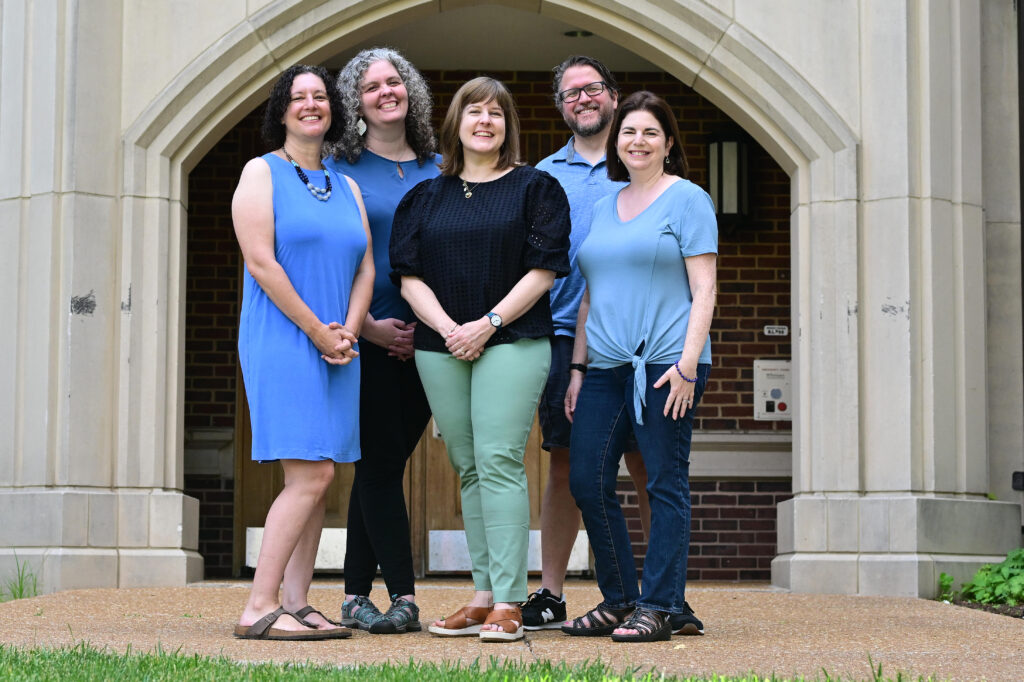
During their first year and beyond, the Liggett Hall seven not only got an education in true friendship but also in experiences distinct from their own. They came from different parts of the country and had diverse interests and religious affiliations. Kalachek, Miller and Spear are Jewish, while Bodan is Presbyterian, Emery is Methodist, Leyba is Catholic, and Moulton is Russian Orthodox Christian. None of them had interacted significantly with people of other faiths prior to college, but they learned by sharing their values and traditions. “I spent more time going to InterVarsity Christian Fellowship events than Hillel that year,” Kalachek jokes.
Free of judgment or tension, the rapport among the seven felt natural and uncomplicated. They also had rich lives and relationships outside of the group. Bodan, Kalachek, Leyba and Spear joined sororities, and, in a pinch, Emery would swoop in as a plus-one at formals. “We all went out and did our own thing but then came home to each other at the end of the day,” Moulton says.
After their Liggett Hall days were over, the group continued to remain a home base for one another, a dynamic that has persisted into adulthood. Consumed with work and family in the first decade after graduation, they lapsed in communication at times but never truly lost touch.
“Friendship has no time limit or geographic boundary.”
Beth Bodan, AB ’97
Although their friendship was forged in an era of letters and landlines, it has survived with the help of technology. Much of the credit goes to Emery, who encouraged his friends to reconnect via Facebook nearly 15 years ago. They now have a robust thread on Messenger. “No exaggeration, we post on it every day,” Moulton says.
“For me, the narrative isn’t really how our friendship began but rather where it is today and the depths of support, affection and care we have for each other,” Emery says. Over the years, they have been there for one another through triumphs, tragedies and the mundane in-betweens. The past two years have been especially rough for the friends. They weathered not only a global pandemic but also the loss of parents and two separate house fires. Despite these difficulties — or perhaps because of them — their friendship has grown stronger.
For her part, Miller is grateful for her WashU friendships but not surprised by them. She has watched her mother, a fellow alumna, maintain close ties with the same group of WashU friends for more than 60 years. She and the others realize their bond is special to them but perhaps not unique to the culture of WashU. Even so, their friendship remains somewhat of a marvel. In Miller’s words, it is “totally random, yet life-changing.”
